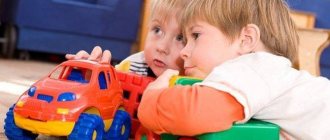Socialization is an integrative process of a subject’s entry into the structure of society, through his mastery of social rules, values, orientations, traditions, the knowledge of which helps to become an effective individual of society. From the first days of his existence, a small person is surrounded by many people, he is gradually included in collective interaction. During relationships, a person gains social experience, which becomes an integral component of the individual.
The process of personal socialization is two-way: a person assimilates the experience of society, and at the same time actively develops relationships and connections. A person perceives, masters and transforms personal social experience into personal attitudes and positions. He is also involved in diverse social connections, performing different role functions, thereby transforming the surrounding society and himself. The real conditions of collective life pose the most pressing problem, requiring everyone to be included in the social structure of the environment. In this process, the main concept is socialization, which allows an individual to become a member of social groups and collectives.
The process of socialization of an individual into social strata is difficult and lengthy, since it includes a person’s mastery of the values and laws of social life, and the development of various social roles.
Personality socialization in psychology is a topic that is actively studied by many social psychologists. After all, a person has a social essence, and his life is a process of continuous adaptation, which requires stable changes and updates.
The process of socialization provides for a high level of internal activity of the individual himself, the need for self-realization. Much depends on a person’s vital activity and ability to effectively manage activities. But this process often occurs when objective life circumstances give rise to certain needs in an individual and create incentives for activity.
Dependence of the process on upbringing and immediate environment
Without any doubt, the greatest influence on a person is exerted by the agents of his primary socialization.
A child’s personality is formed around the age of five or six years and then it does not change globally, it can only be easily adjusted, or the person will pretend to achieve certain goals. The formation of personality directly depends on the events occurring in the life of a child up to approximately six years of age. It’s not for nothing that psychologists say that all problems come from childhood. So all the events that happened in childhood bear an indelible imprint on the personality and remain with the person throughout his life.
It is noteworthy that the same events have different effects on different people. This is due to personal qualities and temperaments. Therefore, there are no identical cases and problems.
This could only happen to this specific person. For anyone else, the situation described would have affected us differently or not at all. It's impossible to predict for sure.
Therefore, parents never know how certain actions will affect the child and whether they will affect them at all. Of course, certain events such as abuse or violence will leave an indelible mark, but most often it is impossible to predict what and how will affect the child. Often the most ordinary things can have a powerful effect.
Each family chooses its own method of raising a child: in some it is too harsh and tough, in others it is too liberal, and in others it is democratic. This is due to the views of the parents and their personal upbringing.
Of course, no one has the right to tell parents how to raise their own child. But the best method for allowing a child to grow and develop normally is one where parents communicate with him regularly. They explain why something cannot be done, rather than simply prohibiting it.
They tell you what the punishment will be for, and communicate a lot with the child, and also spend time with him doing exciting activities.
What is also important is that parents must be consistent. They should not constantly change their minds, and both father and mother should be at the same time, otherwise the child will grow up completely disoriented, with the absence of some kind of value system, and also quite insecure
The described education system is desirable for the good development of the child. But, unfortunately, it is not a guarantee or panacea for anything.
School is a social institution
The school provides children with a systematic education and provides a comprehensive educational process. Educational and educational institutions are the concentration of culture, political and moral values. The school is designed to support socialization, which begins in the family, and correct it if necessary, which is quite difficult to do. The work of an institution depends on the personal and professional qualities of teachers, educators, the microclimate of the team, forms, methods, the modernity of the educational institution, and many other factors.
Human socialization and personality education are inextricably linked processes, complementary and at the same time opposite. Without them, the full development of a person as a full-fledged member of society, who is a formed personality, is impossible.
Formation of a child’s personality in communication
Communication can be represented as a certain type of activity aimed at the mutual exchange of information between interacting individuals. It is of great importance in the development of the psyche of subjects and the formation of rational, cultural behavior. Through communications with psychologically developed individuals, thanks to a wide range of learning opportunities, the child acquires higher cognitive abilities. Therefore, directly through active communication with formed personalities, the baby himself becomes a personality.
The communicative interaction of children with adults leads to the possibility of forming in them emotions that correspond to templates generally accepted today in a particular society.
The peculiarities of the formation of a child’s personality are that the acquired new formations of his emotional sphere, developed as a result of verbal interaction, do not remain within the boundaries of exclusively communicative activity, but also enrich the personality as a whole.
Communication in ontogenesis is the primary, predominant form of the baby’s relationship to the environment, which, first of all, presupposes understanding on the part of the second individual. Initially, under favorable conditions, the mother acts as the second communicating party. As children grow older, this form is replaced by a form that presupposes mutual understanding. In other words, with this variation of communication, the baby no longer simply formulates his own desires, but also takes into account the desires of the environment, on which the embodiment of his own “wants” into reality depends. The formation of the personality of a school-age child results from the influence of:
- new relationships with peers (classmates) and adults (school teaching staff);
- new forms of activity (learning) and communication through which it is included in the system of groups (classroom and school-wide).
The result of this stage of formation is the formation of elements of social feelings and the development of social behavior skills (mutual assistance, responsibility for actions, camaraderie, etc.).
Therefore, the junior school age stage provides significant potential for the development of moral personal qualities. This is facilitated by the compliance and a certain degree of suggestibility of individuals, their gullibility, desire to imitate, and most importantly, the authority of the teacher used.
Communication with children becomes a leading activity during puberty. In interpersonal interaction, adolescents recreate relationships that exist in the “adult” world or contrast them. Through personal communication, adolescent children form their views on the meaning of life, relationships between people, and their own future.
We are on Telegram! Subscribe and be the first to know about new publications!
Principles of harmonious development
The formation of a harmonious personality is aimed at achieving the following goals:
- formation of the consciousness of a citizen, a patriot;
- familiarization with universal human values;
- development of creativity, ability to create;
- formation of an adequate self-concept, the ability of self-realization.
Principles to be followed:
- respectful, trusting relationships between teachers and students;
- conformity with nature (taking into account age, gender, and other natural characteristics);
- cultural conformity (reliance on the cultural traditions of the people);
- humanization, aestheticization of the environment of an educational institution.
What is the formation of a child’s personality?
The family plays an important role in shaping a child's personality. What it is? This is an impact on the baby that will contribute to his socialization, self-development, and formation as a person. It is worth noting that all people grow up differently, which means that parents resort to different methods of education.
One of the development techniques is imitation. The child simply copies the behavior and character traits and thoughts of his parents. There are various methods of raising children. And they are all attractive and effective in achieving certain results. However, there are universal methods that function regardless of the wishes and aspirations of the parents.
One of these methods is called imitation
Notice how in nature, adult animals teach their children the art of survival. The mother goes out hunting with her cubs and herself demonstrates how to catch prey, eat this or that grass, lick one’s lips, etc.
d. The mother shows by her own example what her children need to do in order to survive. The same principle applies among people, but not everyone remembers it. The child carefully watches his parents and repeats everything they do. At the same time, he does not analyze their actions, because he believes that since his parents do this, it means it is useful in order to survive.
For example, young mothers let their children play in the sandbox, while they themselves smoke and drink on benches, discussing some topics. Children look at all this and remember. Should we then wonder why, over time, these same children begin to smoke and drink? As parents behave, so will their children.
The only way to teach children, as well as other people, is by example. Children should not be raised. Nurture in yourself what you want to instill in your child. He will look at you and copy your behavior.
Stages of raising a child:
- A parent has his own character.
- The child begins to respect his parents.
- Respecting, the child imitates his parents.
- The child asks some questions.
- Parents give advice unobtrusively.
In order for your child to listen to your opinion not only in preschool age, but also after, you should instill in him an inner feeling of respect. Once this feeling is achieved, your child will begin not only to imitate you, copying your actions and character, but also to listen to your opinion
It is very important to allow in the heart of your baby to preserve the feeling of love and respect that he feels for his parents, in order to then be able to influence his character development and regulate behavior
During the development process, the baby is not able to evaluate his actions and words, so he performs certain actions, paying attention to how his parents react to them. Depending on their reaction and the educational measures that will be applied to him after each action committed, the child develops certain habitual patterns of behavior.
Socialization factors
There are many factors of socialization, all of them are collected in two large groups. The first group consists of social factors that reflect the socio-cultural side of socialization and problems relating to its historical, group, ethnic and cultural specificity. The second group contains individual personal factors, expressed through the specifics of the life path of each individual.
Social factors mainly include: macrofactors, mesofactors and microfactors, which reflect different aspects of personal development (social, political, historical, economic), also the quality of life of an individual, the ecological situation of the area in which he lives, the presence of frequent occurrences of extreme situations and others social circumstances.
Macrofactors consist of natural and social determinants of personality development, which are determined by its living as part of social communities. Macro factors include the following factors:
- state (country), as a concept that is adopted to highlight a community of individuals living within certain territorial boundaries, united for economic, political, historical, social and psychological reasons. The peculiarities of the development of a state (country) determine the characteristics of the socialization of people in a certain region;
— culture is a system of spiritual aspects of ensuring people’s livelihoods and their socialization. Culture covers all aspects of life - biological (food, natural needs, rest, sexual intercourse), production (creation of material things and objects), spiritual (worldview, language, speech activity), social (social relationships, communication).
Mesofactors are caused by a person living in medium-sized social groups. Mesofactors include:
- ethnos is a historically formed stable collection of individuals in a specific territory that has a common language, religion, common cultural characteristics, and also a common self-awareness, that is, the awareness of each individual that they are united and different from other groups. An individual’s belonging to a nation determines the specifics of his socialization;
- type of settlement (city, region, town, village), which, for various reasons, imparts originality to the socialization of people living in it;
— regional conditions are features characteristic of the socialization of the population living in a certain region, state, part of the country, which has distinctive features (historical past, a unified economic and political system, social and cultural identity);
— mass media are technical means (radio, television, print) responsible for disseminating information to large audiences.
Microfactors are determinants of socialization related to education and training in small groups (work collective, educational institution, religious organization).
The most significant thing in the socialization of an individual is the historical development of a country, group, community, collective. At each stage of development of society, different requirements for the individual arise. Thus, we often find information that an individual could find himself and fully realize himself only within a certain group.
In stable times of social development, individuals in whom group-value orientations predominated were more adapted to society, whereas in turning points, crisis historical moments, various types of people became more active. Some were those whose individual and universal aspirations simultaneously prevailed, others were those who escaped from social crises using their usual stereotypes of orientation towards group norms inherent in the stable development of society.
Under circumstances of social crisis, the predominance of the second type leads to the search for “external” enemies, the removal of all strangers who approach the group, preferring their own (national, age, territorial, professional) group. Individual personal factors are also essential. From the psychological point of view, the process of socialization cannot be a simple and mechanical reflection of the social experience experienced by a person. The process of assimilation of such experience is subjective. Some social situations can be experienced very differently by different individuals, so each person can take out completely different social experiences from the same situations. Much depends on the conditions in which individuals live and develop, where they undergo socialization. This process occurs quite differently at various stages of ontogenesis, during a period of social crisis.
A social crisis is characterized by a violation of the stable living conditions of society, a failure of its inherent value system, alienation of people, and increased selfishness. Particularly susceptible to the negative impact of a social crisis are: adolescent children, young people on the path to personality development, middle-aged people and the elderly.
The most developed people do not accept the views imposed on them; they form their own, independent and different from the socially accepted system of values. But this also does not mean that the vast majority of middle-aged people are immune to the global changes taking place in society. However, the process of their personal socialization proceeds through a strong experience of a personal crisis, or it passes relatively easily if in calm, stable times of the development of society they were among social outsiders, but in crisis circumstances their skills were in demand.
The role of the family in education
Family upbringing plays a major role in shaping the younger generation. This is where preparation for adult life takes place. What is the significance of intrafamily personality formation, and what behavior should parents have in order for their pedagogical influence to be successful? A family is an organized structure; all actions in it must be coordinated. Raising children must fulfill certain functions:
- Child education.
- Instilling a love of creativity and art.
- Laying the foundations approved by society, the moral development of feelings.
- Formation of his personality.
- Providing conditions for the physical development of the child.
Physical development does not mean only morning exercises or performing physical exercises several times a week. Physical education has a positive impact on children's health and includes early development of motor skills such as unsupported walking, sitting and healthy lifestyle habits.
Children should show a love for physical education and sports from early childhood. It is recommended to do this by introducing an entertaining element to joint activities. Because play is considered the leading activity of a preschooler. When a child grows up, his parents will be his role model. Joint sports activities will improve health and increase family cohesion.
Types of education
There are mental, physical, and labor education. According to another classification - moral, physical, labor, aesthetic. Legal, gender, economic, and environmental are often added.
What qualities to cultivate? The basis can be considered the content proposed by the Russian teacher Karakovsky, who identified universal human values: Man, Family, Knowledge, Work, Culture, Earth, Fatherland, Peace. Acceptance of values gives rise to positive traits, moral qualities, correct needs, and actions.
Personal education is divided into models that depend on the development of society at various historical stages, the ratio of social groups, and socio-political orientation. It is enough to recall the foundations of a totalitarian and democratic society, which differ in value systems and require the formation of different personality traits.
Education takes place in two ways:
- By communicating, explaining socially significant goals, principles, values, and norms of behavior. The method eliminates the possibility of searching and making mistakes. It is based on the processing of a person’s existing motivations for understanding his relationship to reality.
- With the help of special conditions created to form cognitive interest and stimulate active socially useful activities.
The first method is traditional, the second is modern. Both of them are effective when used together and complement each other.
Education and formation of a child’s personality
The first cultural environment for children, including their subject-spatial, event, social, and information environment, is the family.
Close people, to varying degrees of severity, create an individual educational environment (for example, provide nutritious food, buy clothes, purchase coloring books, toys, etc.). The ways of influencing the child, their effectiveness for personal development and how painlessly the crises and stages of the formation of the child’s personality will proceed for him depend on how the educational environment is organized.
Contrary to popular belief, specific educational measures in the family aimed at developing or correcting certain personal qualities of children occupy an insignificant place. Naturally, in home education there are certain requirements, prohibitions, a system of punishment and incentives. However, at the same time, various situations occur every day with the participation of parents, through which educational or training measures are woven. Therefore, the younger the baby is, the more organically the training and upbringing, supervision and care are combined. Home education is characterized by a purely individual and personalized impact, specificity, as a result of which it has a beneficial effect on the initiation of activity, through which the personality of a preschool child is formed.
Children's activity, realized in types of activities, is the basis for the development of social and psychological new formations in his personal structure, because specific individual characteristics and qualities are formed only in the processes of interaction of children with the environment, in their initiative activities.
The family is a fundamental factor in educational influence due to the fact that it is the organizer of all kinds of activities for children. After all, a baby from birth does not have the skills to ensure his independent life. Interaction with the world is organized for him by his parents and other participants in family relationships. This is where the great pedagogical meaning lies. Since even a baby who is lucky enough to be born in a supportive environment is not able to fully develop if his opportunities to actively interact with her are limited or deprived.
Family education is the purposeful interaction of adult participants in family relationships with younger ones, which is based on love, respect for the dignity of the child, and also involves psychological and pedagogical support, protection of the baby and the formation of the personality of a preschooler, taking into account his potential and, accordingly, family values and the morals of society.
The specificity of family influence of an educational nature lies in its ability to act as both a positive factor and a negative phenomenon in the development of personality. A beneficial influence on a person is expressed in love. Since no one will love the baby more than his close circle. Along with this, no other social institution can cause more harm in education and personal formation.
The key conditions that ensure optimal family education are: genuine love for the baby, consistency in educational influence, unity of principles and requirements, adequacy of educational influences. Compliance with these listed requirements is the key to the baby’s inner peace and mental stability.
Concept of education
Upbringing is a microfactor influencing socialization . A socialized individual conforms to norms, values, resists the negative effects of the environment, trends that inhibit or deviate the development of individuality.
There is no generally accepted definition of the term. This is due to the polysemy of the concept. It is considered as a socially oriented activity, process, impact on an individual.
Education is the directed influence on human activity of organized institutions of society, the environment, and one’s own activity. It is aimed at the formation of the necessary stable personality traits and individual qualities.
In psychological science, education is an activity that transfers social, historically accumulated experience to the next generation. It is a purposeful action on consciousness, then on behavior through the formation of life-significant attitudes, ideals, and value orientations that provide conditions for further development and preparation of the individual for life in society and work. The goal is the expected planned changes obtained under the influence of prepared actions. Results – the degree of assimilation of planned features, norms, rules. The norms that parents seek from the child become internal ideals, principles of worldview.
Important
Lack of education leads to deviations in mental development and disruption of the formation of social roles required for life in human society.
Nurturing personal qualities in a teenager
It is no secret that all people know from their own experience that the most difficult and difficult age is adolescence. By this period, he already has all the makings of a personality and his individuality has been formed. But it is impossible to say that the process is completed yet, since adolescents are actively developing and creating their spiritual and moral consciousness. Of course, by this age he already knows about the norms of morality and ethics accepted in society, but the adoption of these norms occurs precisely during puberty.
The role of the family in the formation of the spiritual and moral personality of a teenager is quite significant; it is worth talking tirelessly and unobtrusively with children on this topic. Family conversations, if they are confidential and without coercion, can have a strong influence on the child’s internal attitudes
At this stage of life, it is important not to lose the connection and trust of your child. Teenagers involuntarily look for their place among other peers
They do not always find themselves in companies with high moral standards, and there may be a misconception about the norms of morality and spirituality, leading to deviant behavior. In other words, the main influencing factor on the development of a teenager’s personality is the approval and acceptance of his peers, and parents should not openly and negatively criticize this aspiration, and especially his friends. It is worth understanding this dependence; it will not be possible to avoid outside influence, so you need to accept it as a factor that will have an impact on the child’s personal manifestations.
It is important to be able to build a new trusting relationship with your child. New not because the connection is broken, but because interaction and communication move to another level
It is important for a teenager’s personality to be heard, taken into account and consulted. He has a clear conviction that he is old enough and can make his own decisions. You need to be able to give him this feeling, show him that the family and the child are inseparable, but at the same time, he already has the right to a lot.
There cannot be general advice on how to raise a teenager, since each person needs his own approach and methods of influence. But the age patterns are almost the same for everyone, and during this period it may seem that the influence of the family on personality development is losing its position a little. In fact, it is worth changing your parenting methods and treating your child with respect and understanding.
Mechanisms
Mechanisms, or translators, are sources through which accumulated experience is passed on to new generations. The same process applies to socialization.
The mechanisms of personality socialization are conventionally divided into two large groups:
- Socio-psychological.
- Social and pedagogical.
The first group includes the following translators:
- Imprinting. Typical for infants and young children. In its process, information is imprinted in memory using the sensory organs.
- Existential perception. Assimilation of information unconsciously.
- Imitation. Unconscious or conscious following of some pattern, imitation of an ideal.
- Reflection. A process in which internal dialogue occurs, the result of which is the acceptance or rejection of generally accepted norms existing in society.
The following are considered social and pedagogical translators:
- Traditional. Characterizes the assimilation of existing stereotypes in society. The process occurs both consciously and unconsciously.
- Institutional. Works in the process of human interaction with different organizations.
- Stylized. This mechanism is actualized if a person joins a subculture (that is, a group of people whose values do not coincide with the majority) and actively manifests himself in it.
- Interpersonal. This translator works in cases where an individual enters into relationships with the people around him.
Among other things, psychologists identify a number of “laws” of the psyche that facilitate socialization. Based on their characteristics, one can determine the stage of socialization of an individual:
- Law of repetition. Children and adolescents copy the behavior of their elders - brothers and sisters, parents. At an older age, people copy the behavior of their idols, bosses and other people important to them.
- Law of opposition. A person opposes himself, his personality, his character to the whole world and the models accepted in society. As a result of comparison, he can come to a conclusion about which behavior model he likes better.
- Law of adaptation. In order to adapt and interact fruitfully with members of society, a person needs to adapt. To do this, you need to learn to seek compromises and come to agreement.
Each of the described mechanisms is extremely important for the successful completion of the socialization process. Vodos-Service.
Features of children's interpersonal relationships
As we see, children’s relationships throughout preschool childhood develop depending on the development of the child’s personality and the instillation of moral standards. Changes occur from year to year, and by the time they enter school, moral standards for many children become the regulator of relationships between people. This is especially true for children with a high level of social intelligence.
What is typical in the relationships of younger preschoolers
The relationships of 3-4 year old children are characterized by selfishness. The child wants to play with exactly the toy that he likes. If a boy loads his car with sand, then, at the suggestion of an adult, he will agree to have his friend in the sandbox help load it, but will not agree to give up the car to him.
For a younger preschooler, it practically does not matter how his actions are assessed by his peers. “You are greedy!”, “Bad boy” - such children’s exclamations fly, if not past the ears, then past sensory perception. In response, the child may say that he will not play with someone who calls him names. And after a few minutes, the children will happily forget about this incident and resume their games.
Children really pay attention to statements addressed to them in middle preschool age. Around 5 years old, the child is sensitive to how peers evaluate him
This largely determines whether preschoolers want to communicate and play together.
At 5-6 years old, preschoolers are very drawn to children who show themselves to be leaders. They strive to gain recognition from the leader, want to be like him, and are interested in his opinion.
Interpersonal relationships in older preschool age
Older preschoolers see a lot and notice how and what their peers say to them. But at this age, children already perceive quite critically the assessment of their actions and performance results from the same preschoolers. The opinion of an adult is a completely different matter. An adult is a great authority for an older preschooler.
Children at this age spend much more time with their peers than toddlers, due to which their communication skills develop.
In a permanent group they develop stable relationships. The older preschooler becomes attached to some children and friendships begin. Communication with others may not interest you at all.
At this stage, we can identify the types of interpersonal relationships of preschoolers by observing communication in a peer group:
- directly personal
- evaluative
- business
They are extremely rarely found in their pure form. It practically never happens that a preschooler only wants to be friends with some children, only wants to play certain games with others, and with others wants to be interested in their opinions and seek approval. All types of relationships are intertwined.
Desocialization
The concept of desocialization of the individual is closely related to resocialization, and means the destruction of previously mastered and accepted norms and rules of behavior, the destruction of previous attitudes.
What is it and why is this process needed? This process is used by psychologists when a person’s learned norms of behavior prevent him from successfully fitting into society. In this case, a person must desocialize - abandon previous attitudes, and then resocialize - accept new rules of behavior adopted in the group.
Desocialization is necessary for victims of domestic violence, people who went through wars and lived in combat zones, as well as those who moved to other countries with a different cultural heritage or when re-educating individuals suffering from deviant behavior - alcoholics, drug addicts, criminals. “Reconfiguration” of the head in such cases is necessary, and the process plan usually begins with an assessment of the attitudes that the individual sees as unshakable, and proof that this unshakability is apparent.
Correction of behavior culture
A culture of behavior is a set of norms and rules that all people must adhere to when living in society. Parents teach their preschooler to behave correctly from an early age. In this case, adults perform the following actions:
- They teach the rules of personal hygiene.
- The child is told how to speak correctly.
- Learn new words.
- Mom and dad instill a love of reading books.
- They teach the rules of etiquette and friendly communication.
- There is training in correct behavior with other people: educators, teachers, other children and relatives.
In fact, the child develops a culture of activity, speech and communication, as well as personal hygiene skills. The family lays the foundation for moral behavior. From an early age, many children know what is good and bad. This happens thanks to close relatives and parents.
What does it contribute to?
Socialization and adaptation make it possible to form in a person’s brain the necessary set of values and rules that he will subsequently apply to the world. These processes begin in childhood, when the parents of a young child begin to lay the foundation for the first mental and physical skills. After this, the person undergoes training in kindergarten, school and college. During this period, he gains more knowledge from other people, continuing to explore the world. Thanks to this, a person learns to communicate with the individuals around him and understands that the form of interaction with them can be different.
In addition, the socialization of the child is very important, as it teaches him self-control. Gradually, a person begins to learn how to react to certain events in his life. Thanks to this, he learns to distinguish between the internal and external worlds.
Personality is...?
Personality is a concept that is a social characteristic of a person.
The qualities that determine the uniqueness of a particular person are formed under the influence of relationships with surrounding people, under the influence of processes occurring in society. Each social system shapes a person’s personality through education - a process with clearly defined goals and thought out to the smallest detail.
To become an individual, a person must learn social experience and, on the other hand, give his contribution to society within his means. At the same time, he reveals and demonstrates his qualities inherent in him by nature and formed by society through upbringing. In the process of human development, his spiritual, mental and physical characteristics move from quantitative changes to qualitative ones.
Similar works
- Socialization as a factor in personality development: stages, methods and means
- Socialization as a factor in personality development: social dynamics
- Socialization as a factor in personality development: stages, methods
- Socialization as a factor in personality development: social environment
- Socialization as a factor in personality development: personality formation
- Personality and politics: factors of political behavior
- Socialization as a factor in personality development: definition of the concept
- Socialization as a factor in personality development: concept and essence
- Socialization as a factor in personality development: personality and social environment
- Socialization as a factor in personality development: ways and means
- Socialization as a factor in personality development: socialization processes
- Socialization as a factor in personality development: essence and content
- Socialization as a factor in personality development: the concept of personality
- Socialization as a factor in personality development
- Socialization as a factor in personality development
- Socialization as a factor in personality development: means of socialization
- Socialization as a factor in personality development: institutions of socialization
- Socialization as a factor in personality development: the process of formation
- Socialization as a factor in personality development: stage and methods
- Personality and politics: types of personalities in politics
Formation of interpersonal relationships in preschoolers
Why in psychology they talk not only about communication, but also about interpersonal relationships. Essentially, the same process of interaction between two or more people is implied.
But when using the term “interpersonal relationships”, they focus on how in communication the personality, the individual self, is revealed (or, conversely, closed, fenced off) and developed.
The interaction of preschoolers moves to the level of interpersonal relationships at the moment when a personal motive appears in the foreground in communication.
The child no longer just wants to spend time with someone, but specifically wants to play with “the girl from the next apartment”, “with boys, not girls”, go to the zoo with his brother, and not with a group, etc. That is , for a preschooler, specific individuals with their qualities and character acquire significance.
Interpersonal relationships for preschoolers are an opportunity to spend time with likeable people, as well as an opportunity to learn to evaluate another person and form ideas about themselves based on comparison. And for this, the communication partner must arouse interest, certain feelings, and have some experience.
Most preschoolers are focused on positive interpersonal relationships. Therefore, they are more likely to agree to a secondary role in the game than to refuse to play at all. If you need to give your toy, the preschooler, although with regret in his soul, will still hand it to his peer. Although exceptions are often observed, especially in early preschool age.
Forms of interpersonal interaction in preschool children
In the interpersonal relationships of preschool children, the following positions (forms) are observed:
- humane
- selfish
- competitive
Children with a humane attitude help their peers, share toys, invite them to play, and speak positively about the results of other children’s activities. Such preschoolers notice the mood of their peers and support them in case of failures. They don’t show off themselves and their achievements. The child's humane position is expressed in the manifestation of moral qualities and benevolent behavior towards others.
If a child is guided by an egoistic position, he will not even remember the names of the children with whom he just played. But he will know what wonderful toys his peers have. Such a child will never give his favorite toy to another, but he can take someone else’s without permission. A selfish child remains indifferent to the feelings and mood of his communication partners.
A competitive position is chosen by preschoolers who strive to be the best. They react painfully to the successes of other children. In order to express themselves better, they can be generous and sympathetic.
Each of the listed positions is appropriate at a certain age stage. A selfish position is often found in 3-4 year old children who have not yet formed moral criteria.
Children aged 4-5 years are distinguished by their competitive position. Preschoolers of this age amusingly praise themselves and highlight their achievements. In older preschool age, a humane position is already the norm.
If a child is selfish and has a strong desire to compete, it is very important to patiently instill in him humane guidelines in relationships
Concept and factors of personal self-development
Self-development is constant hard work on yourself, self-improvement and the development of personal qualities. Like socialization, this process continues throughout life.
Stages of self-development
Self-knowledge, as well as analysis of one’s own personality and activities in its most diverse manifestations.
The most important and fundamental thing for a person is to understand who she is, what her strengths are, what her weaknesses are. What should she strive for and what is missing? Without self-analysis, no development will be possible; a person simply will not understand what to do and why.
Formation of an ideal image.
Roughly speaking, setting specific goals. A person decides what he wants to be, and then moves on to the next stage.
Creating a self-development plan.
At this stage, a clear plan is created: a person not only understands what he wants, but also knows how to achieve it.
Implementation of a self-development plan.
Everything here is clear from the name: a person creates a clear plan and strictly follows it in order to achieve his goal.
Summarizing
After the goal is achieved, the person analyzes the entire process again from the very beginning.
Basic forms of self-development
Self-affirmation. It makes it possible to express yourself fully as an individual, with the help of confirmation in one form or another.
Self improvement. The desire to become even better in accordance with a previously created ideal image.
Self-actualization. The desire to identify a certain potential in oneself and use it in life, as well as to use one’s capabilities to the maximum to achieve this goal.
Self-development factors
Internal.
These include a person’s personal qualities, worldview, preferences, as well as personal interests and goals.
External.
External factors include everything that surrounds a person: family, education system, government agencies, etc., as well as their influence on him and his development.
Social.
Social factors include a person’s environment, its characteristics and how it affects him. Self-identification also plays an important role here, or more precisely, whether a person feels belonging to a particular social group or not.
Hereditary.
These include any factors that are inherited and can somehow influence his life. For example, this includes a predisposition to psychiatric illnesses.
Bibliography:
1. Andreeva G.M. Social psychology: Textbook, 2003.
2. Socialization of the individual in society [Electronic resource]. / Access mode: https://www.grandars.ru/college/sociologiya/socializaciya-lichnosti.html
3. Stages and mechanisms of socialization [Electronic resource]. / Access mode: https://www.grandars.ru/college/sociologiya/mehanizmy-socializacii.html
4.Structure of personality orientation [Electronic resource]. / Access mode: https://studopedia.net/10_49037_struktura-napravlennosti-lichnosti.html
5. Socialization of the individual. Stages of personality socialization [Electronic resource]. / Access mode: https://www.edu-psycho.ru/socializaciya-lichnosti.html
Attention!
If you need help writing a paper, we recommend turning to professionals. More than 70,000 authors are ready to help you right now. Free adjustments and improvements. Find out the cost of your work
Free estimate
0
Size: 31.28K
Downloads: 135
02.04.15 at 17:58 Author:semina1996
Liked? Click on the button below. It's not difficult for you
, and we
are pleased
).
To download test papers for free at maximum speed, register or log in to the site.
Important! All submitted Tests for free downloading are intended for drawing up a plan or basis for your own scientific works.
Friends! You have a unique opportunity to help students just like you! If our site helped you find the job you need, then you certainly understand how the job you add can make the work of others easier.
Add a job
If the Test work, in your opinion, is of poor quality, or you have already seen this work, please let us know.
Stages of personality formation in preschool age
The formation of personality implies the development of cognitive processes and moral qualities, the formation of a worldview and self-awareness, the development of independence in activity and social activity. This is not a complete list of those features that characterize a person’s personality, but they are the main driving forces in the formation of a child’s personality.
The listed components are laid in preschool age. The active start can be considered 3 years of age, when the child’s self awakens. By the beginning of schooling, personality formation goes through two important stages that contribute to the development of basic age-related characteristics:
- Stage of becoming independent
- Stage of formation of personal initiative.
The first stage of a preschooler’s personal development is aimed at gradually reducing physical dependence on an adult and acquiring independence. The baby repeatedly announces to his parents and grandmothers his need to act on his own. “I myself” sounds in those activities that are interesting to the baby.
The child tries his best. Such an understandable action as folding toys does not interest the baby at all, since it is understandable and feasible. But pouring soup into a plate using a ladle or pinning a pin on a blouse is incredibly exciting!
The second stage involves a transition from the choice that an adult offers the child to the manifestation of one’s own initiative. This is a significant expansion of the boundaries of development. “I want to put together this construction set model,” “I will also water the flowers,” “You know what game I came up with...” - the initiative of older preschoolers extends to all types of activities.
At these stages of a preschooler’s personal development, numerous changes occur. Moral judgments and criteria are developed: what is possible, what is not, what is good and what is bad. Emotional and volitional qualities develop. But in the sphere of personality development, the main achievement of preschool age is independence and initiative.
Personal developments of preschool age
Let us consider in more detail what new formations are formed in the personal development of younger preschoolers, and then in older preschool age.
Changes are especially noticeable during critical age periods. There are two of them in preschool childhood: the 3-year-old crisis, which replaces early childhood with preschool, and the 7-year-old crisis, which precedes the school period.
The child is persistent in order to be allowed to do a certain action on his own. Having received the consent of the elders, the child most often faces a new obstacle - the matter cannot be argued! The button doesn’t fit into the buttonhole, the bag doesn’t rise, the tower of cubes falls apart...
The difficult task ahead is not to give up, but to try again and again until it succeeds. Therefore, such new formations as independence and will appear at the same stage of personal development.
For many children, it is easier to show initiative than determination. This quality is cultivated if adults encourage the cognitive activity of a preschooler. The child became interested in how a sprout emerges from a seed and took the initiative to plant it next to a houseplant. But then you need to water regularly and wait patiently for the sprout to hatch.
In such situations, the preschooler more often needs support in order to keep the goal in the field of his attention and interest. The child needs the same support if actions are unsuccessful.
Along with initiative, it is very important for adults to support the child’s desire for a goal, since this is a valuable personal quality.









